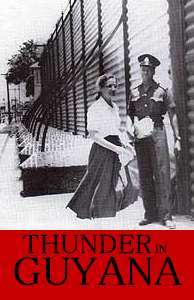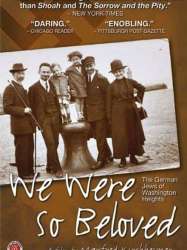Thunder in Guyana is a film of genre Documentary released in USA on 3 may 2003
Thunder in Guyana (2003)

If you like this film, let us know!
Thunder in Guyana is a feature film by Suzanne Wasserman released in 2003. It is a documentary about Janet Jagan (née Rosenberg), an American-born Jewish woman who moved to then-British Guiana and was later elected President. The film was shown on Independent Lens, a series on PBS.
Comments
Leave comment :
Suggestions of similar film to Thunder in Guyana
There are 8965 with the same cinematographic genres, 3314 films with the same themes (including 250 films with the same 3 themes than Thunder in Guyana), to have finally 70 suggestions of similar films.If you liked Thunder in Guyana, you will probably like those similar films :

Paper Clips (2004)
, 1h22Origin USA
Genres Documentary
Themes Films about education, Films about racism, Films about religion, Documentary films about racism, Documentary films about law, Documentary films about war, Documentary films about historical events, Documentary films about religion, Political films, Films about Jews and Judaism, Documentary films about World War II
Actors Tom Bosley
Rating72%





Paper Clips takes place in the rural, blue-collar Tennessee community of Whitwell, where a middle-school class attempts to gauge the magnitude of World War II's Holocaust by collecting paper clips, each of which represents a human life lost in the Nazis' slaughter of Jews. The idea came in 1998 from three of the teachers at the school and was completed in their eighth grade classrooms. The students ultimately succeeded in collecting over 25 million paperclips.

We Were So Beloved (1986)
, 2h25Genres Documentary
Themes Films about racism, Films about religion, Documentary films about racism, Documentary films about law, Documentary films about war, Documentary films about historical events, Documentary films about religion, Political films, Films about Jews and Judaism, Documentary films about World War II
Rating71%






Paragraph 175 (2000)
Directed by Rob Epstein, Jeffrey Friedman
Genres Documentary, Historical
Themes Films about racism, Films about religion, Films about sexuality, LGBT-related films, Documentary films about racism, Documentary films about law, Documentary films about war, Documentary films about historical events, Documentaire sur l'homosexualité, Documentary films about religion, Political films, Films about Jews and Judaism, Documentary films about World War II, LGBT-related films, LGBT-related film
Actors Rupert Everett
Rating76%





Les homosexuels ont été comme tant d'autres les victimes du régime hitlérien. Ils étaient persécutés en vertu du paragraphe 175 du code pénal allemand. Ce paragraphe, datant de 1871, condamnait à la prison "les actes contre nature" entre hommes.
 , 1h27
, 1h27Genres War, Documentary
Themes Films about racism, Films about religion, Documentary films about racism, Documentary films about law, Documentary films about war, Documentary films about historical events, Documentaire sur une personnalité, Documentary films about politics, Documentary films about religion, Political films, Films about Jews and Judaism, Documentary films about World War II
Rating72%






Prisoner of Paradise (2002)
, 1h36Directed by Malcolm Clarke
Origin USA
Genres Documentary
Themes Films about films, Films about racism, Films about religion, Documentary films about business, Documentary films about the film industry, Documentary films about racism, Documentary films about law, Documentary films about war, Documentary films about historical events, Documentaire sur une personnalité, Documentary films about religion, Political films, Films about Jews and Judaism, Documentary films about World War II, Documentary films about films
Actors Ian Holm, Renée Saint-Cyr, Hans Albers, Marlene Dietrich, Kurt Gerron, Peter Lorre
Rating74%






The Colour of Olives (2006)
, 1h37Directed by Carolina Rivas
Origin Israel
Genres Documentary
Themes Films set in Africa, Films about families, Films about religion, Documentary films about law, Documentary films about war, Documentary films about historical events, Documentaire sur une personnalité, Documentary films about politics, Documentary films about religion, Political films, Films about Jews and Judaism
Rating70%






Song of a Jewish Cowboy (2002)
, 18minutesOrigin USA
Genres Documentary
Themes Films about music and musicians, Films about religion, Documentary films about music and musicians, Documentaire sur une personnalité, Documentary films about religion, Musical films, Films about Jews and Judaism

Portrecista (2005)
, 52minutesGenres Documentary
Themes Films about racism, Films about religion, Documentary films about the visual arts, Documentary films about racism, Documentary films about law, Documentary films about war, Documentary films about historical events, Documentaire sur une personnalité, Documentary films about religion, Political films, Films about Jews and Judaism, Documentary films about World War II
Rating78%





Portrecista (The Portraitist) examines the life and work of Wilhelm Brasse, who had been trained as a portrait photographer at his aunt's studio prior to World War II and passionately loved taking photographs. After his capture and imprisonment by the Nazis at Auschwitz concentration camp in 1940, at the age of 23, he was forced to take "identity pictures" of between approximately 40,000 to 50,000 other inmates between 1940 and 1945. With "courage and skill", documenting "cruelty which goes beyond all words ... for future generations", after his liberation at the end of World War II, Brasse "could not continue with his profession" and would never take another photograph.

Baba Lubba (1995)
, 1hOrigin Israel
Genres Documentary
Themes Films about music and musicians, Films about religion, Documentary films about music and musicians, Documentaire sur une personnalité, Documentary films about religion, Musical films, Films about Jews and Judaism

Barricades (1969)
, 1h5Directed by Ram Loevy
Origin Israel
Genres Documentary
Themes Films set in Africa, Films about religion, Documentary films about law, Documentary films about war, Documentary films about historical events, Documentaire sur une personnalité, Documentary films about politics, Documentary films about religion, Political films, Films about Jews and Judaism
 Connection
Connection